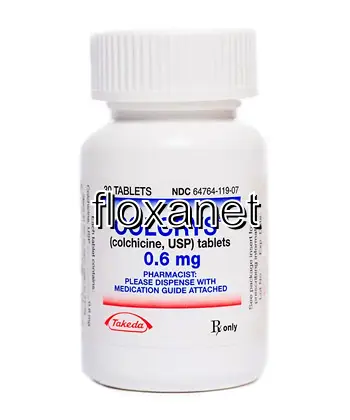Buy Colchicine Online in Australia
| Package | Dosage | Price | Price per Dose | |
|---|---|---|---|---|
| Dosage: 0.5mg | ||||
| 360 pill | 0.5mg | AUD343.62 | AUD0.95 | |
| 180 pill | 0.5mg | AUD188.04 | AUD1.05 | |
| 120 pill | 0.5mg | AUD141.01 | AUD1.18 | |
| 90 pill | 0.5mg | AUD117.50 | AUD1.30 | |
| 60 pill | 0.5mg | AUD99.40 | AUD1.66 | |
| 30 pill | 0.5mg | AUD81.32 | AUD2.70 | |

Colchicine Description
What is Colchicine?
Colchicine is a prescription anti-inflammatory medicine. It is used to treat gout flares and some hereditary fever conditions. The drug is derived from the autumn crocus plant. In pharmacy practice, it is sold as tablets in small doses to control inflammation. It works by affecting white blood cells and their movement, which helps reduce swelling and pain during attacks. This substance has a long history and remains a useful option when used correctly.
How Colchicine works
Colchicine disrupts microtubule formation in cells. This action lowers the activity of neutrophils at the site of inflammation. The result is less swelling and pain during an attack. It is not a painkiller in the usual sense; it targets the inflammatory process. Because of this, timing and dose matter for safety and effectiveness.
Dosage and administration
For an acute gout flare, a common plan is 1.2 mg at the first signs of an attack, followed by 0.6 mg after one hour. Do not exceed 1.8 mg in a 24 hour period. For ongoing prevention, doctors may prescribe low daily doses such as 0.6 mg once or twice daily. Always follow the label and your doctor’s advice. Take Colchicine with meals if stomach upset occurs. Adjustments are needed for older adults or people with kidney or liver problems. In renal impairment, dosing often starts at lower levels and intervals may be longer; your clinician will tailor this to your kidney function and overall health.
Safety and interactions
Colchicine has a narrow therapeutic window. Small changes in dose or interactions with other medicines can raise the risk of serious side effects. Avoid grapefruit juice in some cases, and tell your clinician about all medicines you take. Drugs that raise colchicine levels include certain antibiotics and antifungals, as well as some heart medicines and immune therapies. Your pharmacist can check for interactions. Seek medical help if you have severe diarrhea, vomiting, muscle weakness, or unusual bruising or bleeding.
Common side effects start in the gut. Nausea, vomiting, and diarrhea often occur early in treatment. These problems may lessen with time, but persistent symptoms require medical advice. More rare effects include muscle pain, weakness, or numbness, which can signal a serious issue. Stop the medicine and seek help if these occur. Long-term use or high doses can affect blood cells or the liver, so regular monitoring is important for some patients.
Who should avoid Colchicine
Colchicine is not suitable for everyone. Do not take if you are severely kidney or liver impaired, have a very low white blood cell count, or have a known allergy to colchicine. Pregnant or breastfeeding individuals should avoid use unless a clinician approves. Elderly patients may need dose adjustments and closer monitoring. Always talk with a healthcare professional before starting therapy, especially if you have kidney disease, liver disease, or take other interacting medicines.
Storage and availability
Keep tablets in their original container, tightly closed, at room temperature away from moisture. Store out of reach of children. The medicine is supplied in various strengths; pharmacists can advise on the right product for your needs. If you miss a dose, do not double the next one; skip or take as directed by your doctor or pharmacist.
